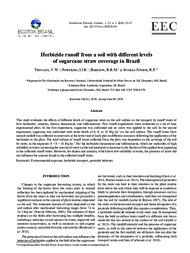Herbicide runoff from a soil with different levels of sugarcane straw coverage in Brazil.
Herbicide runoff from a soil with different levels of sugarcane straw coverage in Brazil.
Autoria: TROVATO, V. W.; PORTILHO, I. I. R.; BARIZON, R. R. M.; SCORZA JUNIOR, R. P.
Resumo: This study evaluates the effects of different levels of sugarcane straw on the soil surface on the transport by runoff water of four herbicides: ametryn, diuron, hexazinone, and sulfentrazone. Two runoff experiments were conducted in a set of nine experimental plots. In the first experiment, sugarcane was cultivated and no straw was applied to the soil. In the second experiment, sugarcane was cultivated with straw levels of 0, 9, or 18 Mg ha-1 on the soil surface. The runoff water from natural rainfall was collected in reservoirs at the lower end of each plot on different occasions following the application of the herbicides to the plots. The total volume of runoff water collected from the plots was dependent on the coverage of the soil by straw, in the sequence: 0 > 9 > 18 Mg ha-1. For the herbicides hexazinone and sulfentrazone, which are molecules of high solubility in water, increasing the amount of straw on the soil produced an increase in the fraction of the applied dose appearing in the collected runoff water. However, for diuron and ametryn, which have low solubility in water, the presence of straw did not influence the amount found in the collected runoff water.
Ano de publicação: 2020
Tipo de publicação: Artigo de periódico
Unidade: Embrapa Meio Ambiente
Palavras-chave: Agrotóxico, Cana de Açúcar, Environmental exposure, Environmental fate, Escoamento, Herbicida, Herbicide residues, Palha, Runoff, Straw mulches, Sugarcane
Observações
1 - Por padrão são exibidas publicações dos últimos 20 anos. Para encontrar publicações mais antigas, configure o filtro ano de publicação, colocando o ano a partir do qual você deseja encontrar publicações. O filtro está na coluna da esquerda na busca acima.
2 - Para ler algumas publicações da Embrapa (apenas as que estão em formato ePub), é necessário ter, no celular ou computador, um desses softwares gratuitos. Sistemas Android: Google Play Livros; IOS: iBooks; Windows e Linux: software Calibre.
Acesse outras publicações
Acesse a Base de Dados da Pesquisa Agropecuária (BDPA) para consultar o acervo completo das bibliotecas da Embrapa.

